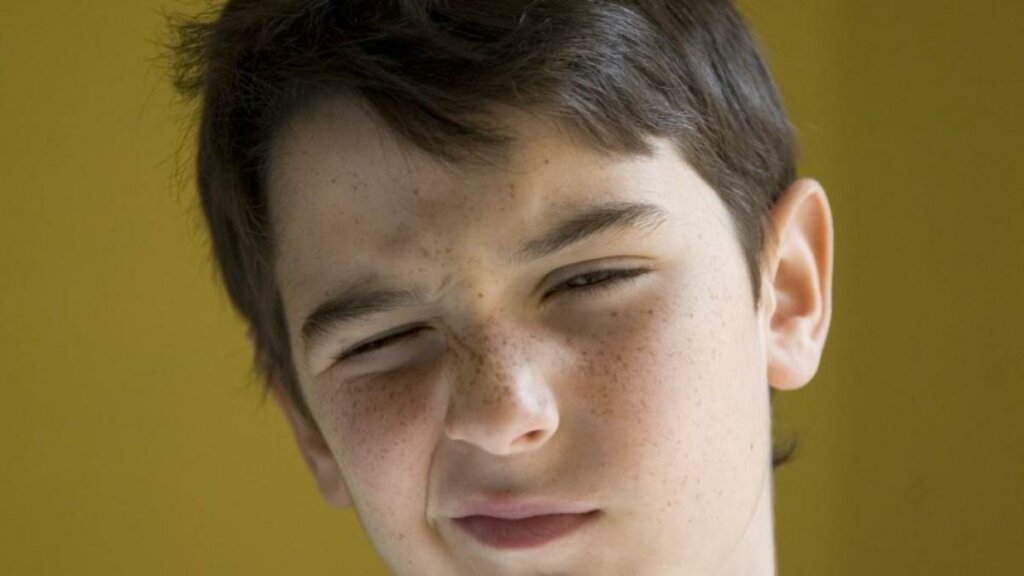TikTok Tics: The Strange Worldwide Childhood Syndrome


Written and verified by the psychologist Valeria Sabater
Blinks, repetitive or jerky movements, unwanted sounds, and strange gestures. These are the symptoms of TikTok tics. They’re unusual behaviors displayed by hundreds of children when they’re constantly exposed to videos of people with Tourette syndrome on TikTok. The phenomenon first hit the media in October when publications like The Wall Street Journal mentioned it.
In the last two years, pediatric hospitals in the United States, Canada, and Australia have seen cases of adolescents suddenly exhibiting unusual tics. This involuntary behavior is especially conspicuous in girls.
At first, doctors couldn’t find a cause. That’s because the symptoms didn’t meet all the diagnostic criteria for Tourette syndrome. However, it didn’t take long for the experts to discover that all the patients had something in common. It was the continued exposure to videos of people with Tourette syndrome on TikTok.
Behind the TikTok phenomenon there’s an obvious problem that’s being neglected. That’s the excessive exposure of our young people to these technological resources.

TikTok tics
The TikTok tics phenomenon began in 2019 and intensified during the pandemic. Indeed, it’s likely that, as a result of lockdown, many children and adolescents increased their use of this app even more. However, it wasn’t until a few months ago that the public became aware of this fact after several doctors spoke out.
These weren’t isolated cases. In fact, it proved to be a worldwide phenomenon. The United States, United Kingdom, Australia, Canada, and Europe reported cases of children with strange tics. One of the experts to speak out about this phenomenon was Dr. Kirsten Müller-Vahl. She’s a professor of psychiatry at the Hannover School of Medicine (Germany).
As an expert in Tourette syndrome, she claims that one thing that stands out is that this particular condition is most often diagnosed in children. It normally appears at a very young age, around the age of six. Furthermore, each individual exhibits their own distinctive types of tics.
However, the clinical cases that came to the fore were those involving adolescent girls. They all exhibited the same types of tics. These were completely new to the medical world.
How does it manifest?
The tics are unconscious and involuntary. In other words, the young people affected (mainly girls) have no control over these particular gestures and expressions.
- They demonstrate repetitive throat clearing.
- They make involuntary grimaces and blinks.
- Jerky movements appear.
- They express words at random in different accents.
There’s one common element of all these unexpected behaviors. The sufferers all watch videos of influencers with Tourette syndrome for hours on TikTok.

What’s the cause?
To begin with, we must clarify that simple exposure to TikTok doesn’t cause this syndrome. Dr. Kirsten R Müller-Vahl and her colleagues explained this in recent research. In this study, they emphasized some interesting data.
TikTok tics and anxiety disorders
The researchers claimed that many of the children suffering from the phenomenon known as TikTok tics had already been previously diagnosed with anxiety or depression. This symptomatology further intensified during the pandemic. In fact, it would appear that the basic problem is none other than the fragile emotional health of young people.
A condition induced by social media
The researchers also introduced the label “mass sociogenic illness” to define this psychological condition known as TikTok tics. Furthermore, they didn’t rule out the possibility that, in the coming years, other manifestations of this condition will emerge and be defined with the same term.
We live in a society where children and adolescents understand and occupy themselves with new technology. This, on its own, wouldn’t necessarily be negative. However, feelings such as loneliness, low self-esteem, emotional mismanagement, and the desire to feel integrated tend to be emphasized via these channels. Indeed, the misuse of social media is shaping striking new psychological disorders.
In recent years, it’s become fashionable for young people to watch videos on TikTok of young people suffering from Tourette syndrome. The Internet algorithms then cause similar content to appear on their screens. This leaves children and adolescents exposed for hours to uncontrolled tics, spasms, and verbalizations that they end up unconsciously imitating.
Tics disappear, but the underlying problem must be treated
We know that constant exposure to these videos causes some children to end up unconsciously imitating all the gestures. Therefore, the problem would be resolved if they could gradually stop viewing them. Nevertheless, the most important thing isn’t, in effect, to stop the appearance of the tics themselves.
The essential thing is to treat the latent anguish in the minds of these young people. Anxiety, sadness, loneliness, and low self-esteem are the real roots of the problem, not so much TikTok itself. For this reason, it’s time we started to take care of the emotional health of our young people.
“]
All cited sources were thoroughly reviewed by our team to ensure their quality, reliability, currency, and validity. The bibliography of this article was considered reliable and of academic or scientific accuracy.
- Basch CH, Hillyer GC, Jaime C. COVID-19 on TikTok: harnessing an emerging social media platform to convey important public health messages. Int J Adolesc Med Health. 2020 Aug 10. doi: 10.1515/ijamh-2020-0111. Epub ahead of print. PMID: 32776899.
- Kirsten R Müller-Vahl, Anna Pisarenko, Ewgeni Jakubovski, Carolin Fremer, Stop that! It’s not Tourette’s but a new type of mass sociogenic illness, Brain, 2021;, awab316,
- Montag, C., Yang, H., & Elhai, J. D. (2021). On the Psychology of TikTok Use: A First Glimpse From Empirical Findings. Frontiers in public health, 9, 641673. https://doi.org/10.3389/fpubh.2021.641673
This text is provided for informational purposes only and does not replace consultation with a professional. If in doubt, consult your specialist.








